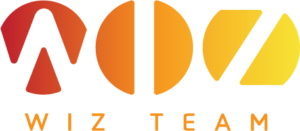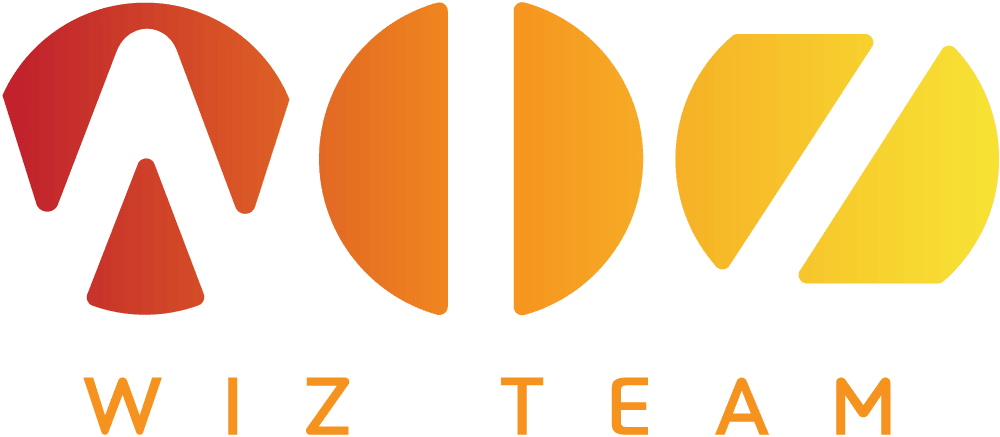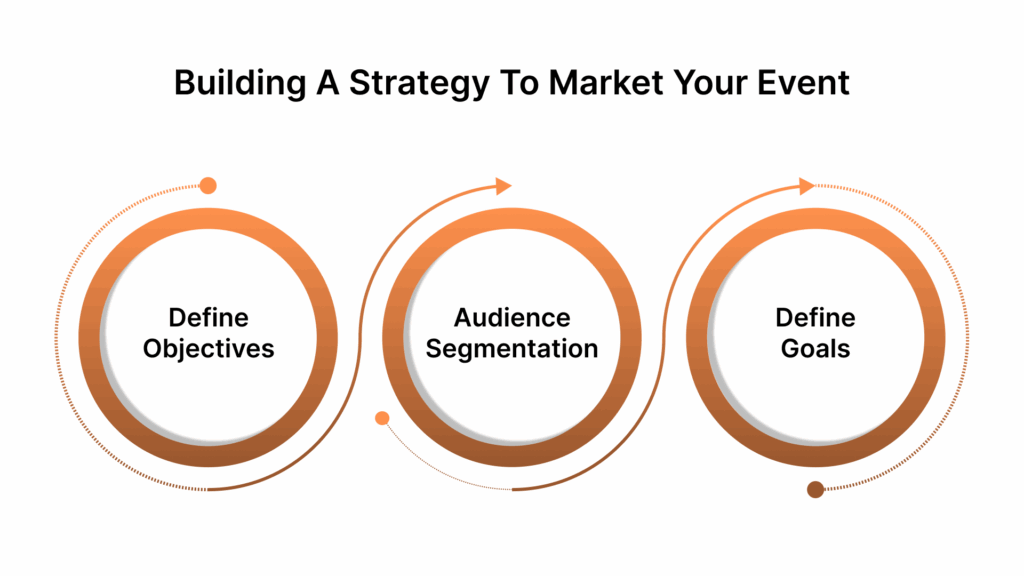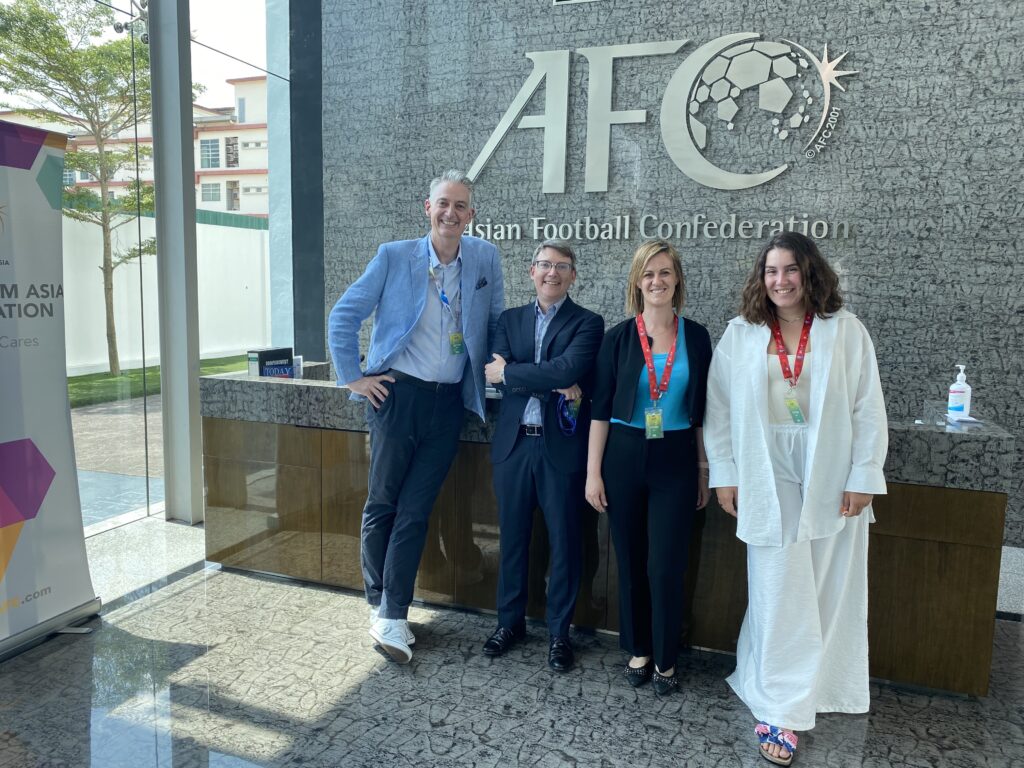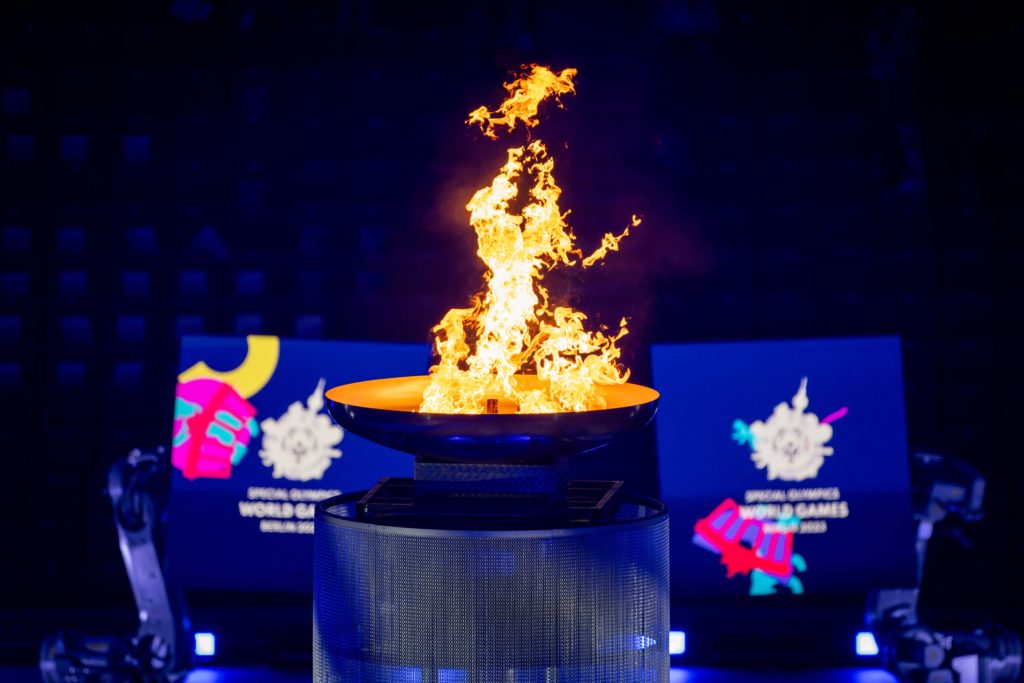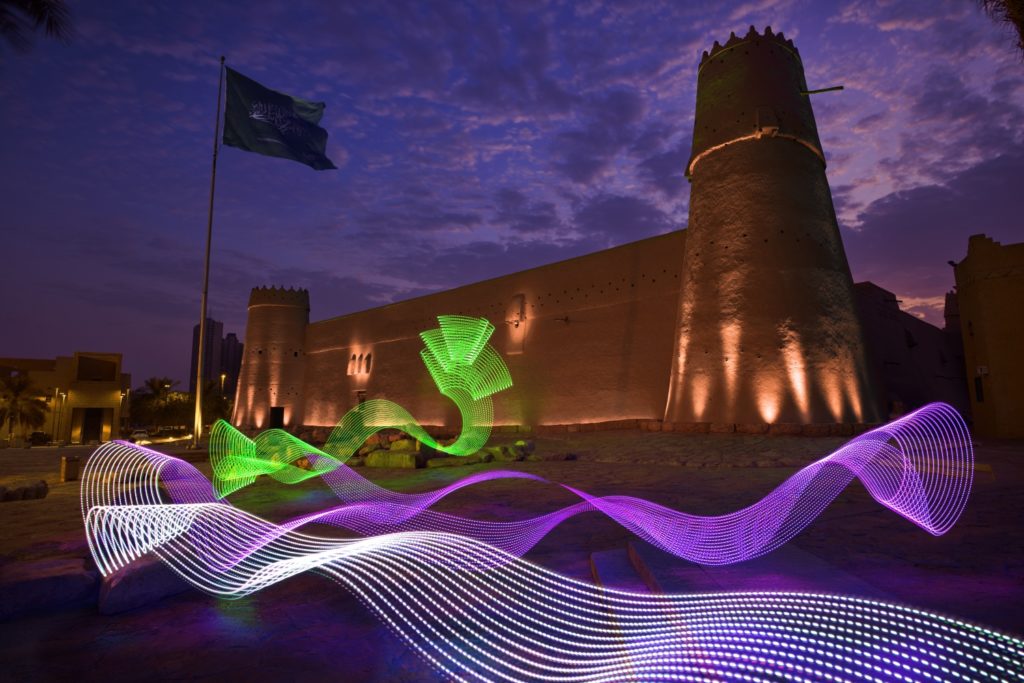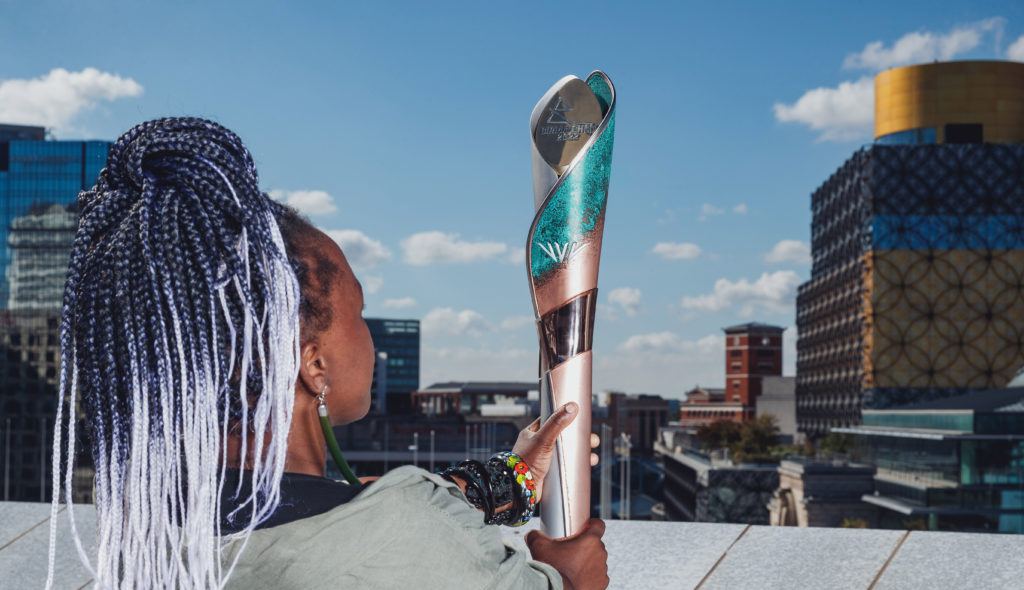In the past, promoting an event was as simple as sending out invitations and hoping the right people showed up. Today, it’s a strategic engine that drives brand visibility, audience engagement, and measurable business outcomes.
It’s no surprise, then, that organizations are increasingly investing in events, with event marketing spending seeing a 12.3% growth in 2025, outpacing PR, direct marketing, and sales promotions. The global events industry is projected to reach $1.55 trillion in 2025, with estimates of $2.5 trillion by 2035.
Behind every packed conference is a team that’s spent months not just planning, but promoting and persuading. You’ve crafted campaigns, juggled social posts and emails, built landing pages, and tracked every click. Yet, you’re still faced with last-minute registrations, shifting interests, and the constant pressure to prove your marketing spend made an impact.
This guide is for you, the marketers and event professionals focused on driving results. Here you will find a new blueprint for how to market an event to ensure your next event not only succeeds but makes a lasting impact.
Key Summary
Begin by setting clear, measurable goals that align with your business objectives to guide your marketing strategy.
Segment your audience and personalize your messaging to ensure it resonates with the right attendees.
Use a multi-channel approach, including email, social media, paid ads, and influencers, to maximize reach and engagement.
Engage attendees during the event with live updates, interactive features, and social media interaction to keep the momentum high.
Follow up post-event with thank-you messages, surveys, and content recaps to nurture relationships and maximize ROI.
What is event Marketing? Why it’s more than just promotion?
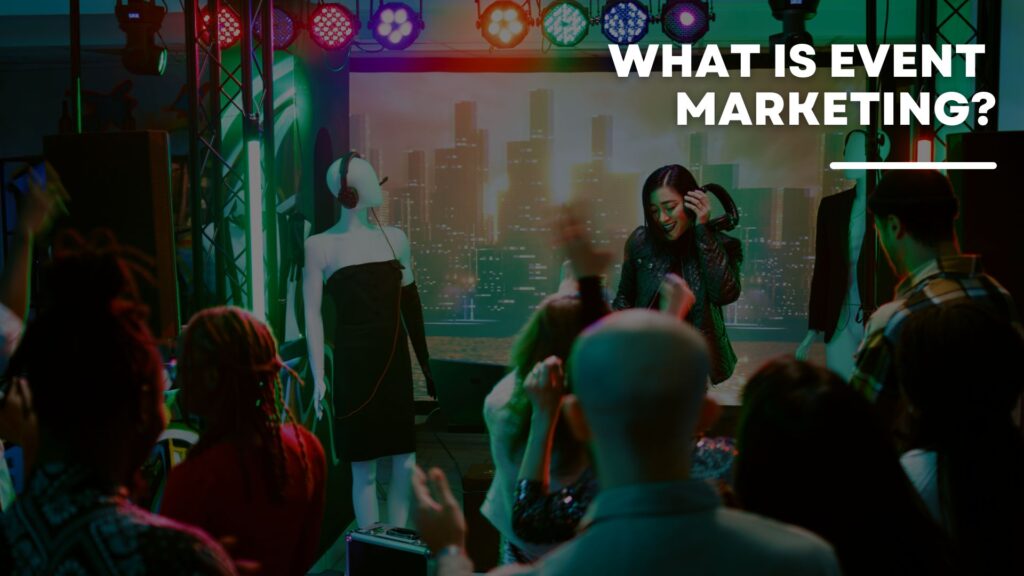
Modern event marketing is a two-way street. On the one hand, it’s about promoting your event, building anticipation, driving registrations, and ensuring the right people show up.
On the other, it’s about using the event itself as a powerful platform to promote your brand, mission, or message. Every touchpoint, from the first save-the-date to the post-event follow-up, is an opportunity to shape perceptions and deepen relationships.
Successful events today go beyond just marketing, they integrate the entire attendee experience into the brand story. 91% of attendees form opinions about a brand based on their event experience, and nearly 70% are more likely to become loyal customers after a positive event.
This is where the lines blur between marketing, operations, and attendee experience. You can have the most creative campaign and the most compelling content, but if your check-in process is chaotic or your technology fails, the entire event and your marketing investment can suffer.
Platforms like Wiz-Team’s Event-Works are designed to bridge this gap, ensuring your event runs smoothly from registration to real-time engagement so your marketing efforts truly pay off.
With a clearer understanding of how event marketing goes beyond mere promotion, it’s time to focus on how to turn this knowledge into action.
Building a strategy to market your event
The best way to publicize an event, promote it to the right audience, and maximize your marketing ROI is to let data guide every decision, from goal-setting to messaging and channel selection.
1. Align event and business objectives
Start by defining what success looks like for your event. Are you aiming to generate leads, increase attendance, drive revenue, or increase brand awareness? Set clear, measurable goals using the SMART framework (Specific, Measurable, Achievable, Relevant, Time-bound).
Example: “Increase qualified registrations by 20% compared to last year” or “Achieve a 90% satisfaction rate in post-event surveys.”
Pro Tip: Tie your event KPIs directly to your organization’s marketing objectives. This ensures every promotional effort, be it advertising your event or launching a creative marketing idea, supports your bigger business goals.
2. Segment your audience and develop personas
Knowing your audience is central to effective event marketing. Use data from registration forms, past events, and analytics tools to segment your potential attendees by role, industry, interests, or behavior.
Tip: Event Management Platforms like Wiz-Team centralize attendee data, making it easier to analyze, segment, and reach your ideal audience with precision.
3. Align goals and set clear objectives
To stand out and truly advertise your event, you need a value proposition that speaks to your audience’s motivations. Use your audience insights to craft messaging that highlights what makes your event unique. It could be its exclusive access, top-tier speakers, or hands-on experiences.
Personalize your communications: For example, send a different message to first-time attendees versus returning VIPs.
Use data from past feedback and engagement to refine your messaging and content topics.
A strong foundation is crucial for successful promotion and advertising, ensuring every message resonates with your audience and supports your broader marketing goals. It’s time to lay the groundwork for your event’s identity.
The Foundation for successful event promotion and advertising
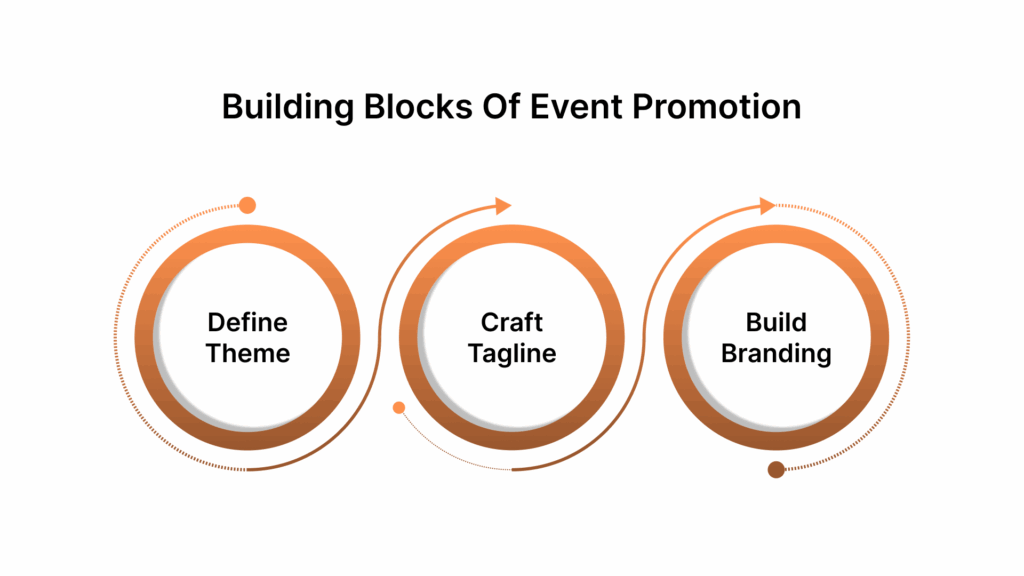
Before you get into marketing channels and creative promotion ideas, it’s crucial to establish a strong foundation for your event’s identity. This is the first step in learning how to market an event effectively.
1. Define your event theme and purpose
A clear theme gives your event a distinct personality and helps shape every aspect of your marketing. Whether it’s a futuristic tech summit, a wellness retreat, or a creative workshop, your theme should resonate with your target audience and reflect your event’s goals.
2. Craft a memorable tagline
A catchy, concise tagline communicates your event’s unique value proposition in a single sentence. It should be easy to remember, share, and use across all your marketing materials.
Example: “Innovate. Connect. Lead: The 2025 Future Leaders Summit”
3. Build consistent event branding
Your event’s branding, including logo, color palette, fonts, and imagery, should be consistent across every touchpoint: your website, social media, emails, signage, and even your event app. Strong branding not only makes your event recognizable but also builds trust and excitement among potential attendees.
Why these basics matter:
They make your event instantly recognizable in a crowded market.
They unify your marketing ideas for the event, making every ad, post, and email feel cohesive.
They help you advertise and publicize your event more effectively, as people are more likely to remember and share a well-branded experience.
With a solid foundation in place, it’s time to amplify your event’s reach. Choosing the right channels to promote your event ensures that your message reaches the right audience in the most effective way possible.
Selecting the best channels to market your event
Today, the best way to market, promote, and advertise your event is to build an omnichannel strategy. Modern event marketing is about creating measurable, high-impact experiences across digital and physical spaces, powered by data and optimized by AI.
Audiences today bounce between email, social, websites, and ads, often at the same time. High-performing event campaigns use multiple, coordinated touchpoints to reinforce messaging and drive action.
Key channels for event promotion and advertising
Here’s a table highlighting key channels for event promotion.
Channel | Strengths & Best Practices | Trends & Insights |
Email Marketing | Highest ROI ($36 per $1 spent) enables segmentation, automation, and personalized reminders. Use for pre-event invites, timed reminders, and post-event follow-ups. | Remains the foundation of event marketing. |
Social Media | Real-time engagement, community building, and viral potential. Use platform-specific strategies, speaker/partner amplification, and user-generated content. | 78% of marketers say it’s their most impactful channel. |
Paid Digital Ads | Fast, targeted reach via social ads, search/display, and retargeting. Use lookalike audiences, geotargeting, and urgency-driven campaigns. | Over 50% of planners dedicate >50% of the budget to paid promotion. |
SEO & Content Marketing | Capture high-intent registrations with optimized landing pages, blog posts, and guest content. Use FAQs, schema, and event-related keywords. | Content-driven discovery is outperforming generic ads. |
Influencer & Partner Marketing | Amplifies reach through trusted voices. Hire speakers, sponsors, and micro-influencer networks for authentic promotion and co-branded campaigns. | User-generated and partner content drives higher engagement. |
PR & Earned Media | Builds credibility and expands reach. Issue press releases, pitch media, and activate community partnerships. | Essential for credibility and organic buzz. |
Offline & Experiential | Local partnerships, print materials, and guerrilla activations for in-person events. | In-person experiences are resurging post-pandemic. |
Tips For choosing channels To market your event
When choosing the right channels to market your event, it’s essential to use data, ensure integration across platforms, and focus on optimizing your approach to reach the best results. Below are key tips to guide your strategy:
Data-Driven targeting
Use analytics from past events and digital campaigns to identify where your audience is most active. Platforms using AI and geolocation can personalize touchpoints and boost engagement.
Channel integration
The most successful event marketers don’t just “spread the word”, they create a connected journey across channels. HubSpot’s INBOUND 2024, for example, achieved 12,500+ registrations and a 95% onsite rate by integrating segmented emails, targeted ads, content marketing, real-time social, and partner activations into a cohesive campaign.
- Budget allocation:
Over a third of marketing budgets are now dedicated to events, with a significant portion invested in digital and paid channels. Prioritize channels that align with your audience’s preferences and your event’s objectives.
Test and optimize:
Start with 2–3 primary channels, support others, and continuously analyze performance. Use A/B testing, retargeting, and sequential campaigns to refine your approach.
After identifying the best channels for your event, it’s time to look at the full marketing journey. From initial planning to post-event engagement, a comprehensive strategy will ensure your event not only reaches the right audience but leaves a lasting impact.
How to market an event from start to finish
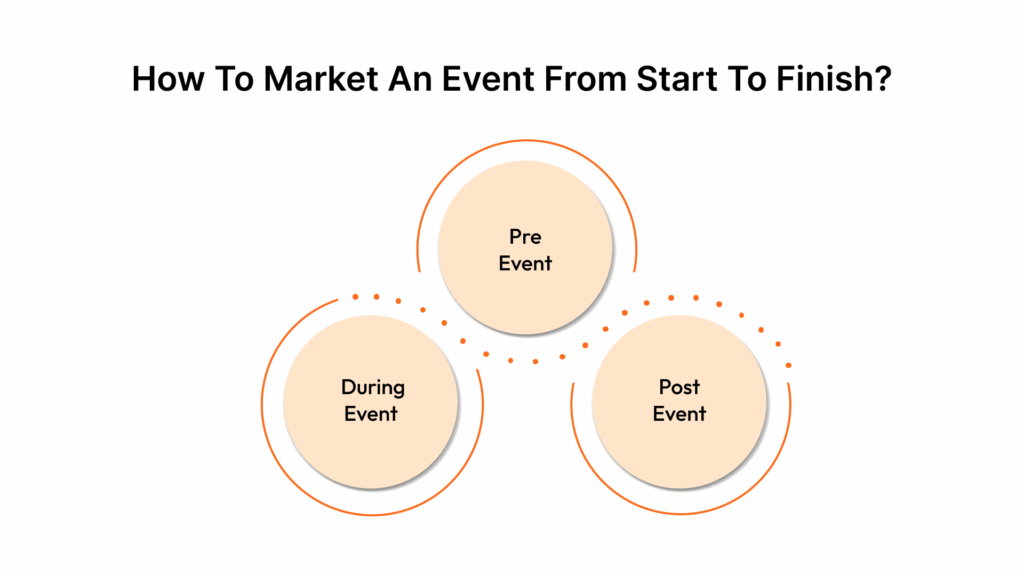
Marketing an event is far more than just sending out invites and hoping for the best. To truly market an event effectively, you need a comprehensive, strategic approach that spans from pre-event awareness to post-event engagement.
1. Pre-Event: Building anticipation and excitement
The foundation of a successful event marketing campaign is building anticipation and securing early registrations. This phase is all about creating buzz, positioning your event as a must-attend experience, and giving your audience enough time to make arrangements to attend.
Actions to take:
Teasers & sneak peeks: Create a sense of exclusivity by sharing behind-the-scenes content, teaser videos, or glimpses of your event highlights. This builds curiosity and anticipation, keeping your audience engaged before the main event.
Early Bird offers: Encourage early sign-ups with limited-time discounts, VIP access, or exclusive content. Early bird promotions are not only an effective sales tactic, but they also create a sense of urgency.
Targeted email campaigns: Personalize your outreach based on audience segmentation. Send tailored invitations, countdowns, and event teasers that highlight what attendees will gain from participating.
Social Media engagement: Start building momentum by using eye-catching social media posts. Implement countdowns, highlight event features, and share insights from past events. Engage your community through polls, questions, and hashtags to create a buzz.
Strategic partnerships & Influencer collaborations: Amplify your reach by collaborating with influencers or industry partners. Use their networks to promote the event and tap into relevant audiences.
Registration optimization: Ensure your event website or landing page is branded, mobile-friendly, and optimized for conversions
Content Marketing: Publish behind-the-scenes blogs, interviews, and social posts that showcase your event’s unique value.
Releases & Media outreach: Secure coverage in relevant industry outlets to boost visibility and credibility.
2. During-Event: Maximizing engagement and real-time interaction
Keep the energy high and continuously engage your audience to ensure they have a meaningful experience. Deliver a seamless, memorable experience that encourages participation and social sharing.
Actions to take:
Real-Time social media updates: Post live updates on social media channels with photos, videos, and quotes from the event. Use real-time stories or live streams to share key moments with both attendees and online followers. This creates an ongoing buzz that extends beyond the physical space.
Interactive experiences: Incorporate live polling, Q&A sessions, and instant feedback loops to engage attendees. Make sure your event encourages participation and conversation.
Event hashtags & social sharing: Create a branded event hashtag to encourage attendees to share their experiences on social media. Share attendee posts, thank them for engaging, and build a community-driven narrative.
Networking & engagement opportunities: Facilitate one-on-one connections or group discussions, making sure your attendees feel valued and actively involved in the event. Virtual events can use breakout rooms, while physical events can host networking mixers or intimate speaker meetups.
3. Post-Event: Nurturing long-term relationships and building on momentum
Your marketing endeavors should not cease once the event ends. The post-event phase is crucial for reinforcing relationships and extending your event’s impact.
Actions to take:
Thank-You campaigns: Send personalized thank-you emails to attendees, speakers, and partners.
Surveys & feedback: Collect actionable insights with post-event surveys and polls.
Content recaps: Share highlight reels, session recordings, and key takeaways on your website and social channels.
Lead nurturing: Segment your audience for tailored follow-up: exclusive offers, invitations to future events, or ongoing community engagement.
Media coverage & testimonials: Publish attendee testimonials, media mentions, and success stories to reinforce your brand’s credibility.
Data analysis: Review your KPIs, like registrations, engagement, and ROI, to inform and optimize your next event marketing plan.
Wiz-Team’s analytics dashboard offers post-event metrics, helping you understand attendee behavior, engagement rates, and ROI. Use this data to further optimize future marketing campaigns and target the right audience with post-event content.
A checklist for marketing your event
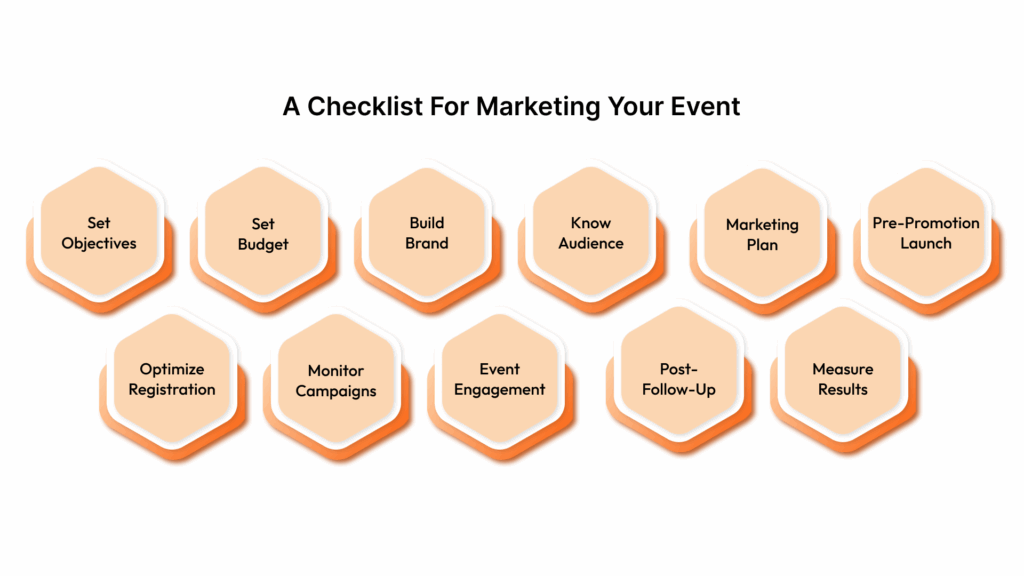
Use this checklist to ensure your event marketing is strategic, organized, and effective, from initial planning to post-event follow-up. Each item reflects best practices to help you maximize reach, engagement, and ROI.
1. Set clear goals and objectives
Define what success looks like (registrations, leads, sales, engagement, etc.)
Set measurable KPIs for each stage of your event marketing
2. Establish your budget and timeline
Allocate resources for marketing, technology, and logistics
Develop a detailed timeline with milestones and responsibilities
3. Build your brand foundation
Create a memorable event theme and tagline
Design consistent branding (logo, colors, fonts) for all materials
4. Know your audience
Identify and segment your target audience
Build attendee personas to tailor messaging and channel selection
5. Develop your event marketing plan
Choose the best channels: social media, email, website, paid ads, PR, offline
Craft compelling messaging and creative assets for each channel
6. Launch pre-event promotion
Announce your event with teasers, save-the-dates, and early-bird offers
Schedule automated email campaigns and social media posts
Collaborate with influencers, partners, and sponsors for wider reach
7. Optimize registration and engagement
Set up a user-friendly event website or landing page
Enable mobile registration and secure payment options
Use event technology (apps, QR codes) for engagement and data collection
8. Monitor and adjust campaigns
Track registrations, engagement, and conversions in real-time
Adjust tactics based on performance analytics
9. Drive during-event engagement
Share live updates and behind-the-scenes content on social media
Use interactive tools: polls, Q&A, gamification, networking lounges
Ensure seamless on-site logistics and branding
10. Execute post-event follow-up
Send thank-you emails to attendees, sponsors, and partners
Collect feedback via surveys and polls
Share event highlights, photos, and videos on digital channels
Nurture leads and invite attendees to future events
11. Measure results and optimize
Analyze key metrics: attendance, engagement, satisfaction, ROI
Debrief with your team to identify wins and areas for improvement
Document learnings and update your checklist for the next event
However, it’s not just about the marketing strategy. Operational excellence is the backbone that ensures everything runs smoothly and amplifies your effort
How operational excellence supports event marketing
Great marketing makes a promise. Seamless operations keep it.
You can have the most creative campaign, the boldest branding, and the smartest channel strategy, but if your event operations falter, your marketing promise falls flat. Attendees judge your brand not just by what you say but by how flawlessly you deliver.
Operational excellence isn’t just a “nice-to-have”; it’s the foundation that supports every aspect of event marketing. Even a single operational hiccup can lead to negative reviews, social media backlash, and lost future opportunities.
When registration is effortless, check-in is smooth, and every detail runs like clockwork, you reinforce trust and satisfaction. Operational excellence turns attendees into advocates, amplifying your marketing ROI. But when logistics break down: long lines, missing badges, tech glitches, your audience’s perception can shift in seconds, undoing months of marketing effort.
How Wiz-Team delivers effortless operations in event management
Wiz-Team’s Event-Works platform is designed as an all-in-one, highly customizable event management solution that streamlines every aspect of event operations, whether for small gatherings or large-scale international events. Here’s how it ensures operational excellence:
Centralized registration: Customizable forms, automated confirmations, and real-time attendee data make sign-up effortless and reliable.
Accreditation & Access Control: Streamlined badge printing, secure access management, and instant updates ensure only the right people are in the right places.
Integrated communication: Automated, personalized emails keep attendees informed at every stage, reducing confusion and boosting engagement.
Live Data & analytics: Real-time dashboards enable your team to monitor attendance, troubleshoot issues, and optimize the event experience on the fly.
Personalization and scalability: Workflows and communications can be tailored to each event, allowing seamless management, whether it’s a small meeting or a large international conference.
Expert support and partnership: Wiz-Team’s experienced professionals provide guidance and support from planning to execution, ensuring events run smoothly and efficiently.
Wiz-Team has a proven track record of delivering event management solutions for high-profile organizations, including the European Union institutions, the Olympic Games, and major international events. Our expertise spans seamless registration, accreditation, and visitor management for some of the world’s most demanding clients.
Here is one case study showcasing our work with the Commonwealth Games.
Case study: Core Games Management System: Birmingham 2022 Commonwealth Games
Wiz-Team powered the Birmingham 2022 Commonwealth Games by providing its Event-Works platform as the core Games Management System, streamlining accreditation, access control, sport entries, and baton relay operations. Their solution managed over 130,000 registrations and nearly 1 million entry scans, while real-time analytics integration enabled informed decision-making and significant operational cost savings. Wiz-Team also delivered 200+ days of on-site support, ensuring seamless, efficient event delivery at scale.
Conclusion
Marketing an event demands a strategic, data-driven approach that integrates effective messaging, targeted outreach, and operational excellence. From building anticipation before the event to ensuring real-time engagement during it and maintaining long-term relationships after, every phase plays a pivotal role in delivering a successful event.
Wiz-Team’s Event-Works platform helps you streamline your event operations, optimize your marketing strategies, and ensure everything from registration to post-event follow-up runs seamlessly.
Take the first step toward operational excellence and maximize your event marketing ROI with Wiz-Team’s Event-Works platform. Contact us today.
FAQs
What are the most effective ways to increase event registrations?
To boost event registrations, focus on early bird promotions, targeted advertising, and personalized outreach through segmented email campaigns. Utilizing social proof, such as testimonials from past events, can also encourage sign-ups. Offering exclusive content or VIP access for early registrants creates urgency and value, motivating potential attendees to register sooner.
How can I measure the success of my event marketing campaign?
To measure the success of your event marketing, track key performance indicators (KPIs) such as registration numbers, engagement on social media, and website traffic. Post-event surveys and feedback can also provide valuable insights into attendee satisfaction and areas for improvement. Additionally, calculating ROI based on lead generation, revenue, or brand exposure is crucial to assess overall effectiveness.
How do I choose the best platforms for event promotion?
Choosing the right platforms depends on where your target audience spends their time. If you’re targeting professionals, LinkedIn and email marketing might be most effective. For a younger, more dynamic audience, Instagram or TikTok could be better. Consider a mix of channels that provide both paid and organic reach, and use analytics to monitor performance and adjust your approach accordingly.
How can I keep attendees engaged during the event?
To maintain attendee engagement during the event, incorporate interactive elements such as live polls, Q&A sessions, and social media contests. Offering opportunities for networking, either in-person or virtually, and providing real-time event updates through apps or social media platforms also keeps the audience engaged. The key is to make attendees feel involved and valued throughout the event.
What should I do after the event to maintain momentum?
After the event, continue engagement by sending thank-you emails, sharing event highlights and recordings, and gathering feedback through surveys. Nurture leads by offering post-event content, exclusive offers, or invitations to future events. This helps keep your audience connected to your brand and increases the likelihood of retaining them for upcoming events or business opportunities.
#WizJourney
